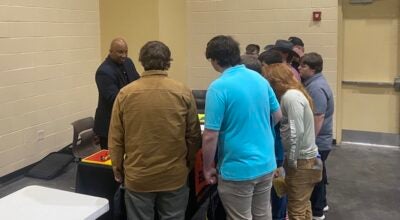Board talks cell phone policy
Published 9:12 pm Tuesday, August 18, 2009
The talk of the Chilton County Board of Education meeting Monday was how the system handles cell phones in its schools.
The board discussed starting a system-wide policy to outline how schools should reprimand students found with cell phones, but the board eventually decided to follow a principals’ agreement made earlier this summer.
Cell phones, pagers and similar devices are banned from schools unless students have an approved reason, such as health concerns, to have one.
Carrying one is an intermediate offense in the student handbook. Students caught with cell phones face a variety of punishments, including confiscation of the phone, suspension or time in the alternative school.
Each case is left up to individual principals, and punishments can vary from school to school. The board discussed Monday if penalties should be the same at all schools.
Principals from schools throughout the system recommended the following policy:
First offense, the phone is taken away for five days.
Second offense, students receive a three days out-of-school suspension, and the phone is taken away for 15 days.
Third offense, students go to the alternative school for 10 days, and the phone is taken away for the remainder of the semester.
However, not everyone completely supported the guidelines.
“I see the punishment for the second offense as being worse than the third,” said Superintendent Keith Moore. “I’m all for students going by the rules, but on the second offense, a three-day suspension on block schedule is tough.”
Chilton County High School Greg DeJarnett said the punishments match what is done at his school already.
The principal said students who do forget and bring phones inside the school are encouraged to give it to a teacher or other staff for the day.
“If they realized they brought a cell phone in, and they’re afraid it might go off … give it to a coach, teacher or administrator until the end of the day.”
He said the penalties for the second offense are tough because repeated violators aren’t respecting principals or the rules.
“There shouldn’t ever be a need for a second offense,” DeJarnett said.
The school board decided to let the principals’ agreement stand for now but tabled the matter so it can be brought up at any meeting in the future. Board members said they can still enact a system-wide policy if the agreement doesn’t work.
“The only problem is going to be when one school does one thing and another school does something different,” said Moore.
Attorney John Hollis Jackson, who represents the system, said principals don’t have to follow the agreement and can use any punishment that fits an intermediate offense.
“It seems to be wide open, as in it’s at the discretion of the principal,” said Jackson. “They are not bound to it.”






